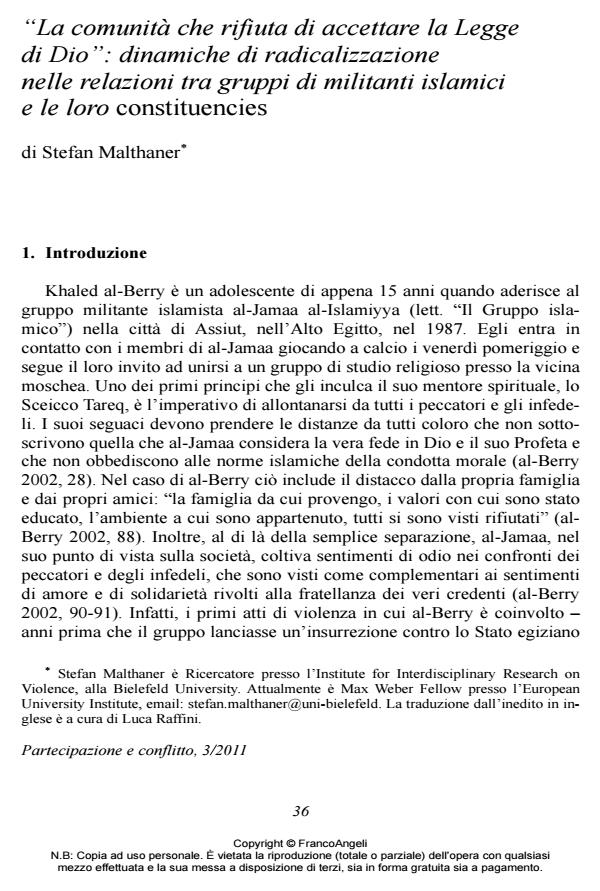"The community which refuses to accept God’s Law": Dynamics of radicalization in the relationship between militant Islamist groups and their constituencies
Journal title PARTECIPAZIONE E CONFLITTO
Author/s Stefan Malthaner
Publishing Year 2011 Issue 2011/3
Language Italian Pages 22 P. 36-57 File size 392 KB
DOI 10.3280/PACO2011-003003
DOI is like a bar code for intellectual property: to have more infomation
click here
Below, you can see the article first page
If you want to buy this article in PDF format, you can do it, following the instructions to buy download credits

FrancoAngeli is member of Publishers International Linking Association, Inc (PILA), a not-for-profit association which run the CrossRef service enabling links to and from online scholarly content.
In the study of radicalization and processes of political violence, the relationship between militant groups and their social and political environment is considered mainly with respect to interactions between the militants and their adversaries (police, governments). Drawing on an analysis of the Egyptian militant Islamist group al-Jamaa al-Islamiyya between 1986 and 1997, this paper argues that beyond this dyadic relationship, interactions between the militants and their constituencies [social environment] may contribute to processes of radicalization. In the case of al-Jamaa al-Islamiyya, two basic mechanisms could be identified that reinforced this process: Firstly, the militants’ agenda of transforming the Muslim community’s social and cultural order (fighting moral corruption in society) caused resentment and triggered a cycle of rejection and radicalization, culminating in attempts to impose norms of moral conduct by force, which, in turn, contributed to a further loss of support. Secondly, the weakening of support during the violent conflict with the police triggered a dynamic of social isolation and radicalization, either in a pattern of withdrawal and disengagement, with militants turning away from local arenas and engage in national (or international) terrorist campaigns; or in a violent struggle over controlling the community, in which the militants reacted to what they perceived as betrayal by trying to coerce and terrorize the population into compliance and into not collaborating with their enemy, thereby destroying all remnants of supportive relations with local communities.
Keywords: Radicalization, Islamist movements, Egypt, political violence, interaction
Stefan Malthaner, "La comunità che rifiuta di accettare la Legge di Dio": dinamiche di radicalizzazione nelle relazioni tra gruppi di militanti islamici e le loro <i>constituencies</i> in "PARTECIPAZIONE E CONFLITTO" 3/2011, pp 36-57, DOI: 10.3280/PACO2011-003003